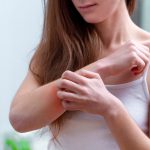Ashwagandha in Sanskrit means “smell of the horse” to correlate it with the strength of…
Read MoreHaving great skin requires care, attention and love. If we pollute it with junk or impurities, we cannot expect it to show good results. But a clear and glowing face is an investment worth your time, right?
Your skin health is a mirror of your overall health. It is the largest organ in our body and our first line of defence from external elements like viruses, toxins, dust, etc. External factors like sun exposure, pollution, chemicals in water and cosmetics, etc., affect your skin health. But, the key to improve skin health is what diet and food you intake every day.
The best indicators of skin health are its smooth texture, warm touch, and supple and elastic in its tone. Any breakouts, dryness, or roughness on the skin’s surface is a telltale sign of something amiss. The body uses your skin to transmit symptoms affecting various organs, hormonal variations, digestive issues, and even mental issues like stress.
One of the essential factors for a healthy life is how you look. Your skin health is a good reference for how you are maintaining or improving your overall health. As the largest organ in the body, the skin is constantly shedding off old skin cells and replacing them with new ones. A healthy skin care routine ensures that new skin cells are adequately nourished. Without proper care, new skin cells can appear dull and lifeless as you age. Most premature skincare issues in your later life can be attributed to the nourishment and care you gave your skin during your adolescent years.
Multiple factors support and also harm skin health. Numerous studies have found that foods that cause inflammation are detrimental to skin health. Consumption of highly processed food, sugar, dairy products, packaged meals, and refined carbs leads to skin issues and premature ageing. Also, foods high in glycemic index cause acne breakouts and other skin issues due to increased insulin secretion. Dairy products have been known to alter hormone levels resulting in a decline in skin health.
Here are a few practices you can indulge in at your own time, in the comfort of your own home. These home remedies for skin are bound to bear fruit if practiced effectively and frequently:
Dab a few ice cubes on your face, wrapping it up in a clean, cotton cloth. Doing so will shrink your pores, reduce puffiness, and refresh your face, giving it a slight rosy glow. This treatment is perfect for summers and humid climates.
Steam machines are now readily available in the market, but if you do not want to spend money on these machines, filling a big bowl with hot water can help you achieve the same results. Keep this steaming bowl half a hand away from your face and let the steam generated from it caress your face gently. This treatment is very effective for acne-related problems as it thoroughly cleanses the skin, boosts blood circulation, and hydrates the skin. It also boosts the development of collagen.
With the increasing use of cosmetic products, the skin loses its natural allure and glow. These products remove your skin’s moisture and essential oils, leaving it dry and dull. Cleansing the skin helps keep these accumulated residues at bay, giving your skin plenty of opportunities to breathe freely. Making these cleansers at home is pretty simple, where you can utilize your kitchen supplies. For instance, using yoghurt or dahi as a cleanser is very effective as it contains lactic acid, which encourages your skin to get rid of dead cells through exfoliation. The protein present in yoghurt helps tighten your skin by reducing pore size as well.
To help balance out your skin’s pH levels, toners come into the picture. These toners can be made at home or they can be purchased over-the-counter. Toners help to detoxify your skin and make it look brighter in the short run. In the long run, toners help reduce the permanence of the acne scars or blemishes and diminish spots as well. Apple Cider Vinegar (ACV) is the best solution to make toners at home. Dilute one tablespoon of ACV with three tablespoons of water and apply it to your face with a cotton swab. Due to its acidic nature, this might make your skin burn/itch a little, but that will not last for long and will not have any harmful effect on your skin health. Select a good ACV made from natural ingredients for the best results.
Just as internal hydration of the body is important by drinking enough water, so is the external hydration of the skin. Here is where moisturizers come into the picture. Revitalizing dull and dry skin by using effective moisturizers regularly is a practice that you must make a part of your daily life. It protects the skin by acting as an extra layer of shield against dirt and pollution. Massaging your skin (face and body) with moisturizers right before you sleep is a good choice as it boosts blood circulation and induces a relaxed state of sleep. You can whip up an easy DIY moisturizer like an Aloe Vera Moisturizer. After cleansing, you need to mix some aloe vera gel with one tablespoon of coconut or olive oil and massage your skin with this mixture. Aloe Vera can help lighten the complexion apart from tightening your pores. Using an aloe vera gel instead of one loaded with chemicals will be better in the long run.
It is quite alarming that many people do not hesitate to walk out of their homes without applying a decent coating of sunblock, considering how hazardous UV Rays are. Brown spots and pigmentation have become a common phenomenon, thanks to the depleting ozone layer (a result of global warming). In this scenario, using sunscreen holds dire importance as it helps block these rays and keeps the skin appearing youthful for longer. The skin becomes less blotchy, and the visibility of red veins diminishes, making the skin less likely to develop premature signs of ageing. Choose sunscreens with natural ingredients and the least chemicals that can harm your skin health and the environment.
Adding a lot of dairy to your diet can never be a good option for people wanting to steer clear of skin issues. Dairy products can increase oil production, blocking pores and causing acne on your face. There’s terrible news for caffeine lovers as well – if you’re someone whose life depends on coffee, make yourself aware that coffee is extremely drying to your skin.
Short term gains for skin health through cosmetics could be detrimental to skin health as it ages. Know what’s in your skincare closet and make conscious choices to add natural ingredients to everything that touches your skin. From cleansers to moisturizers to soaps to oils, choose herbal, non-toxic products that your skin will thank you for.
What is the secret to the yummiest snacks available in an instant at your favourite food chains? Deep-frying. This technique can be a perfect example of something that’s a boon for the industry but a bane for its consumers. While on the one hand, you skip the meal prep time and savour the food that pleases your taste buds. On the other hand, the same food has contributed heavily to the increase in the world’s obesity index. On top of this, deep-fried foods contain saturated fats and refined carbs that lead to excess oil production in your skin. Lastly, such low quality, high-calorie food can also worsen your complexion, cause acne, and promote other skin conditions.
Cheese, a superfood and everyone’s favourite, is one of the few things that the doctor and the dietitian can put on the menu. However, an excess of dairy food in your system can directly affect your body’s oil levels and block pores. This may also result in the growth of blocked pores and blackheads, and thus breakouts become common. So, any chance you get, you might want to pick an apple over that bowl of mac n cheese and even your favourite pizza with loaded cheese.
The government has put a cap on the amount of trans fats allowed in our diets. This is because of its extremely unhealthy nature. Still, much of this deadly nutrient has found its way to our kitchen shelves in one form or another. Responsible for conditions like high cholesterol, increased risk of heart diseases, and increased inflammation of the skin – foods rich in trans fat should be miles away from your dining table.
Your favourite glass of aerated beverage adds nothing to your diet. According to various studies, consuming a glass of any aerated beverage is as good as drinking a glass full of water infused with up to 7 tablespoons of sugar. Yet, it has long been a part of popular culture. To a point where everything from pizza to popcorn – seems incomplete without it. Can you believe that we have internalised a product that is of zero nutritional value in our diet? In fact, soda does you no good, but it does plenty of harm.
And this can especially destroy your skin health, making it lacklustre, more susceptible to acne, and speeding up wrinkle production.
Over the years, the gluten-free diet has become a more common thing. From small bakeries to big conglomerates, people have started paying attention to the needs of those who want to eliminate gluten from their diet, all for a good reason. Since it’s a fairly new concept, many suffering from the condition aren’t even aware of it. Usually, people who don’t take gluten kindly always suffer from acne and inflammation. If you think you have acne-prone skin, it is advisable to go gluten-free for a few days to measure results. Living a gluten-free lifestyle helps in leading a healthier life as well.
Following these simple steps can display marked changes and improve skin health and appearance. And the simplicity and low-cost nature of these practices make them more likely to be maintained over a period of time. Natural options over cosmetic treatments are and will always be the best choice.
Take a look at Home-Made Face Packs for Great Skin
Generally tried and tested home remedies for skin involving natural ingredients are safe to use. Your skin is very sensitive, so it is advisable to follow trusted sources and consult your doctor to determine if particular herbs/ingredients are suited for your specific skin type.
Most of your typical skin problems, like acne, wrinkles, skin ageing, etc., can be managed through natural home remedies to improve skin health. Using natural herbs and other pure ingredients in your daily skincare routine, following a nutritious diet, managing stress, and getting ample sleep will work wonders to improve skin health.
Fruits and veggies that are rich in nutrients like Vitamin A, E and C, foods that reduce inflammation like ginger and turmeric, foods rich in fibre, and detoxifying foods are great for youthful skin. Amla, aloe vera, tulsi giloy, etc., juices help detox and keep your skin supple and glowing.
Processed foods, dairy products, trans fat, gluten, foods high in saturated fats that cause inflammation, sugar, refined foods/oils, and foods high in preservatives are harmful to your skin. Carbonated drinks, sodas, and alcohol will cause premature ageing of your skin.
Yes. Home remedies for skin really work. Aloe vera, amla, and other herbs/ingredients can be used in traditional home remedies for skin to ensure optimum hydration, cleansing, and moisturizing of the skin.


We are a team of food scientists and Ayurveda experts at Kapiva. Our mission is to raise awareness and educate people on ancient principles and herbs found in traditional texts. We work together to develop the most comprehensive content on Ayurveda which is grounded in peer-reviewed, scientific research.

Ashwagandha in Sanskrit means “smell of the horse” to correlate it with the strength of…
Read More
Pimples - we’ve all had them and we all hate them. And if you’ve ever…
Read More
Don’t all of us want healthy glowing skin? And while there is a ton of…
Read More
Most of us have experienced skin irritations at some point or the other. When the…
Read More